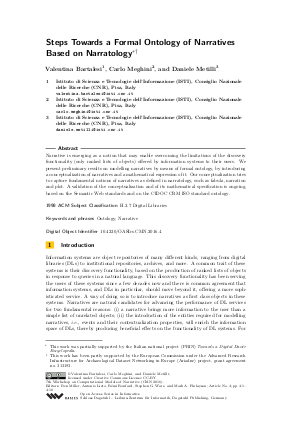Steps Towards a Formal Ontology of Narratives Based on Narratology
Authors Valentina Bartalesi, Carlo Meghini, Daniele Metilli
-
Part of:
Volume:
7th Workshop on Computational Models of Narrative (CMN 2016)
Part of: Series: Open Access Series in Informatics (OASIcs) - License:
 Creative Commons Attribution 3.0 Unported license
Creative Commons Attribution 3.0 Unported license
- Publication Date: 2016-10-25
File

PDF
OASIcs.CMN.2016.4.pdf
- Filesize: 463 kB
- 10 pages
Document Identifiers
Subject Classification
Keywords
- Ontology
- Narrative
Metrics
- Access Statistics
-
Total Accesses (updated on a weekly basis)
0PDF Downloads0Metadata Views
Abstract
Narrative is emerging as a notion that may enable overcoming the limitations of the discovery functionality (only ranked lists of objects) offered by information systems to their users. We present preliminary results on modelling narratives by means of formal ontology, by introducing a conceptualization of narratives and a mathematical expression of it. Our conceptualization tries to capture fundamental notions of narratives as defined in narratology, such as fabula, narration and plot. A validation of the conceptualization and of its mathematical specification is ongoing, based on the Semantic Web standards and on the CIDOC CRM ISO standard ontology.
Cite As Get BibTex
Valentina Bartalesi, Carlo Meghini, and Daniele Metilli. Steps Towards a Formal Ontology of Narratives Based on Narratology. In 7th Workshop on Computational Models of Narrative (CMN 2016). Open Access Series in Informatics (OASIcs), Volume 53, pp. 4:1-4:10, Schloss Dagstuhl – Leibniz-Zentrum für Informatik (2016)
https://doi.org/10.4230/OASIcs.CMN.2016.4
BibTex
@InProceedings{bartalesi_et_al:OASIcs.CMN.2016.4,
author = {Bartalesi, Valentina and Meghini, Carlo and Metilli, Daniele},
title = {{Steps Towards a Formal Ontology of Narratives Based on Narratology}},
booktitle = {7th Workshop on Computational Models of Narrative (CMN 2016)},
pages = {4:1--4:10},
series = {Open Access Series in Informatics (OASIcs)},
ISBN = {978-3-95977-020-0},
ISSN = {2190-6807},
year = {2016},
volume = {53},
editor = {Miller, Ben and Lieto, Antonio and Ronfard, R\'{e}mi and Ware, Stephen G. and Finlayson, Mark A.},
publisher = {Schloss Dagstuhl -- Leibniz-Zentrum f{\"u}r Informatik},
address = {Dagstuhl, Germany},
URL = {https://drops.dagstuhl.de/entities/document/10.4230/OASIcs.CMN.2016.4},
URN = {urn:nbn:de:0030-drops-67051},
doi = {10.4230/OASIcs.CMN.2016.4},
annote = {Keywords: Ontology, Narrative}
}
Author Details
References
-
James F. Allen. Towards a general theory of action and time. Artificial intelligence, 23(2):123-154, 1984.

-
Aristotele. Poetica. Laterza, 1998.

-
Mieke Bal. Narratology: Introduction to the theory of narrative. University of Toronto Press, 1997.

-
Marc Cavazza and David Pizzi. Narratology for interactive storytelling: A critical introduction. In Technologies for Interactive Digital Storytelling and Entertainment, pages 72-83. Springer, 2006.

-
Seymour Chatman. Characters and narrators: Filter, center, slant, and interest-focus. Poetics Today, 7(2):189-204, 1986.

-
Chris Crawford. Chris Crawford on interactive storytelling. New Riders, 2012.

-
B. A. Davey and H. A. Priestley. Introduction to lattices and order, chapter 3. Cambridge University Press, second edition, 2002.

-
Donald Davidson. Essays on actions and events: Philosophical essays, volume 1. Oxford University Press, 2001.

-
Martin Doerr. The cidoc conceptual reference module: An ontological approach to semantic interoperability of metadata. AI Mag., 24(3):75-92, September 2003.

-
Martin Doerr, Chryssoula Bekiari, Patrick LeBoeuf, and Bibliothèque nationale de France. Frbroo, a conceptual model for performing arts. In 2008 Annual Conference of CIDOC, pages 6-18, 2008.

-
Marcello Frixione and Antonio Lieto. Representing concepts in formal ontologies. compositionality vs. typicality effects. Logic and Logical Philosophy, 21(4):391-414, 2012.

-
Gérard E. Genette and Jane E. Lewin. Narrative discourse: An essay in method. Cornell University Press, 1983.

-
Algirdas Julien Greimas, Daniele McDowell, and Alan R. Velie. Structural semantics: An attempt at a method. University of Nebraska Press, 1983.

-
David Herman. Narratology as a cognitive science. Image and Narrative, 1(1), 2000.

-
Robert Kowalski and Marek Sergot. A logic-based calculus of events. In Foundations of knowledge base management, pages 23-55. Springer, 1989.

-
Antonio Lieto and Rossana Damiano. A hybrid representational proposal for narrative concepts: A case study on character roles. In OASIcs - OpenAccess Series in Informatics, volume 41. Schloss Dagstuhl - Leibniz-Zentrum fuer Informatik, 2014.

-
Inderjeet Mani. Computational modeling of narrative. Synthesis Lectures on Human Language Technologies, 5(3):1-142, 2012.

-
Inderjeet Mani. Computational narratology. Handbook of narratology, pages 84-92, 2014.

- Jan Christoph Meister. Narratology, 2012. Synthesis. American Museum of Natural History. Available at URL: http://ncep.amnh.org.
-
Rob Miller and Murray Shanahan. Some alternative formulations of the event calculus. In Computational logic: logic programming and beyond, pages 452-490. Springer, 2002.

-
Erik T. Mueller. Commonsense Reasoning: An Event Calculus Based Approach. Morgan Kaufmann, 2014.

-
Vladimir Propp. Morphology of the Folktale, volume 9. University of Texas Press, 1973.

-
Ryan Shaw, Raphael Troncy, and Lynda Hardman. Lode: Linking open descriptions of events. In The Semantic Web, pages 153-167. Springer, 2009.

-
Victor Shklovsky. Art as technique. Russian formalist criticism: Four essays, 3, 1965.

-
Tzvetan Todorov. Grammaire du décaméron. Mouton, The Hague, 1969.

